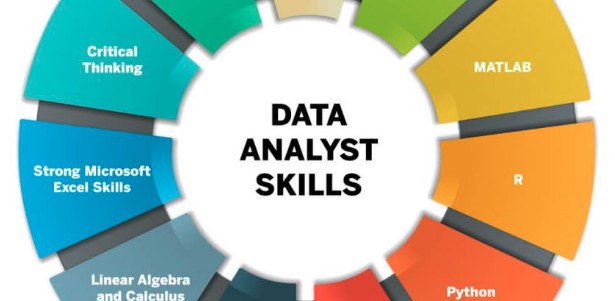Top 10 Must-Have Skills Data Analysts’ Should Possess to Get Hired in 2022
Many companies today recognize the importance of a data-driven approach to business and are seeking analysts to provide insight into the constant stream of data collected.
In a recent survey, U.S. executives predicted they would prefer job candidates with data skills by 2022 and that demand for analysts would only grow as our physical world becomes more digitized.
There is no need to worry if you are just starting your research program and wondering how you can make the transition into a career in data analytics.
When looking for data-driven job postings, you can get a good idea of which skills are most important, but many analyst roles are extremely nuanced, making it difficult to determine which competencies are most important.
Most Important Skills You Should Have As Data Analyst
There are plenty of skills you need to have, and among those, here’s the list of which you must possess in-depth knowledge to keep yourself competitive in this world of competitiveness.
- Structured Query Language (SQL)
- Microsoft Excel
- R or Python-Statistical Programming
- MATLAB
- Linear Algebra and Calculus
- Data Visualization
- Presentation Skills
- Machine Learning
- Critical Thinking
- Communication
Let’s look at the top seven must-have skills that data analysts need to thrive in the job market.
1. SQL
Structured Query Language, or SQL, is a global industry-standard language for database programming and the most crucial skill for any data analyst.
It is often considered to be the “graduated” version of Excel as it can handle large data sets that Excel cannot handle.
SQL is a skill almost every organization needs to have – whether the job involves managing and storing data, relating multiple databases (like the ones Amazon uses to suggest products you might be interested in,) or creating or changing database structures altogether.
The number of job postings requiring SQL skills rises every month, and a person with advanced skills can expect a salary of well over $75,000 with the right experience.
Learning SQL is the first step to working with Big Data, even if you aren’t a technical person.
2. Microsoft Excel
Probably the first thing that comes to mind when you think of Excel is a spreadsheet, but this tool has much more power than that.
Even though programming languages like R or Python are more appropriate for handling large data sets, the use of advanced Excel methods like writing macros and using VBA lookups remains popular for smaller lifts and lighter, quicker analyses.
Depending on the size of your startup or company, your database may even be in Excel at first. Businesses in every industry have relied on the tool over the years, so knowing how to use it is critical.
If you are interested in learning more about structured data analytics, there are a variety of free resources and structured data analytics classes available online.
3. R or Python–Statistical Programming
Anything Excel can do, Python or R can do better and almost 10 times faster. Unlike SQL, Python and R can perform tasks Excel cannot perform. They are powerful statistical programming languages used in predictive analytics and advanced data analysis. Both are industry standards.
Data analysts need to master one of these languages in addition to SQL so that they can truly be effective. The question is: which one do you need to learn?
Python and R are both free and open-source, so employers aren’t concerned about which their employees prefer to use as long as the results are accurate.
Despite this, for ad-hoc analyses and exploring data sets, analysts prefer R over Python since it was developed specifically for analytics.
4. MATLAB
Programming in MATLAB provides the capacity for implementing algorithms, reading matrices, manipulating data, and plotting data, among other capabilities.
MATLAB has become a favorite of businesses interested in big data, as it greatly reduces the number of time analysts normally spend preprocessing data, and it facilitates data cleaning, organization, and visualization.
One of the most notable advantages of MATLAB is the ability to execute any machine learning model built in its environment across multiple platforms.
While having a working knowledge of MATLAB isn’t absolutely necessary for jobs as a data analyst, it can improve your marketability to employers given its many applications.
5. Linear Algebra and Calculus
It is essential to have advanced mathematical skills when it comes to data analytics. During their undergraduate studies, some data analysts choose math or statistics majors to gain a deeper understanding of the theories behind the real-world analytical practice.
Specifically, linear algebra and calculus are the two fields of study that play a major role in analytics. Machine learning and deep learning use linear algebra to operate on vectors, matrices, and tensors.
In the same way, calculus is used to build objective/cost/loss functions guiding algorithms to do their job.
Even so, you may find that building a strong theoretical background is not necessary before pursuing real-life applications. In fact, some tech experts suggest taking a reverse path.
A writer and data analyst for Towards Data Science, Ibrahim Sharaf El Den shared his thoughts on top-down approaches to data science in the article “Mathematics for Data Science” in 2019.
6. Data Visualization
Having the ability to tell an engaging story with data is essential to keep your audience engaged and get your message across.
Also, having trouble getting your point across to others will come from being unable to quickly and easily identify your findings.
Because of this, the impact of data visualization can make or break your business.
An analyst presents the findings of his or her analysis clearly and concisely by using eye-catching and high-quality charts and graphs.
Considering its user-friendliness, Tableau’s visualization tool is widely recognized among analysts as an industry standard.
7. Presentation Skills
A strong data visualization program is accompanied by effective presentation skills. The problem is, presenting isn’t always as natural as you’d like it to be!
There are times when even experienced presenters experience their nerves getting better. If you want to succeed, start practicing, then practice until you’ve got it down.
As an additional technique for becoming more comfortable with presenting, Forbes suggests setting specific goals for improvement and putting the audience ahead of yourself.
8. Machine Learning
A fundamental understanding of machine learning is becoming a critical component of an analyst’s toolkit as artificial intelligence, and predictive analytics are two of the hottest topics in data science.
Machine learning is not the area of expertise of every analyst, but the tools and concepts are crucial to learning in order to succeed in the field.
To be successful in this field, you will first need to master statistical programming skills. You can also use an “out-of-the-box” tool like Orange to build machine-learning models.
9. Critical Thinking
Finding answers to your questions requires knowing what to inquire about in the first place, which can be very challenging. If you choose to become an analyst, you need to think through your questions.
Data analysts are charged with identifying and synthesizing connections that may not always be obvious.
There are a number of ways you can improve your critical thinking skills despite the fact that this ability is innate, at least to some extent.
Keeping an open mind when trying to find a solution, such as asking yourself basic questions, can help you avoid getting carried away with a complex explanation.
Furthermore, you need to think for yourself instead of relying on existing facts.
10. Communication
It is necessary to be able to explain to others your findings at the end of the day. You can be the most talented, insightful data analyst on the planet, but if you cannot communicate the patterns you see to people without technical expertise, your work is incomplete.
A good data analyst should be able to speak both English and technical jargon with trained peers and provide clear, high-level explanations so that business-centered decision-makers can understand them instead of getting confused.
However, you may still need to develop your skills as a data analyst if you are not able to do so.
Enhancing Your Skills
To advance your data analytics career, you need to know what skills you need to begin working with data. Industry professionals are talking about Big Data, and organizations want to hire people with these short-supply skills that are in high demand.
The more you know about data analytics today, the more opportunities you’ll have tomorrow – and the more money you’ll earn.
You can develop these seven skills in various ways to achieve success in a career in analytics if you are seriously looking to make this transition.
You will ultimately choose how to accomplish this depending on your background, how much time and resources you can dedicate, and what your personal goals are.
For aspiring data analysts, it may be helpful to use free resources and books when starting out. As a result, beginners will become more familiar with the terminology and establish a solid foundation for future advancement.
If you need to make a more structured move into the field, however, you should focus on learning and practicing the skills needed to become an expert data analyst.
Taking formal education courses is one of the most effective ways to achieve this. In this highly competitive industry, you can prepare yourself to succeed by taking online courses, attending boot camps, and earning an advanced analytics degree.
Insights
You may want to become a data analyst, but you will need skills in the field to succeed. Discover academic opportunities close to home; browse undergraduate and graduate programs.
Think about enrolling in a data analytics boot camp if you need a quicker and more affordable solution!
Students can experience a broad view of a particular tech discipline in a multi-week educational program at an affordable price.
Develop a solid foundation of skills as a data analyst by exploring educational opportunities. Discover a whole new world of data analytics!










